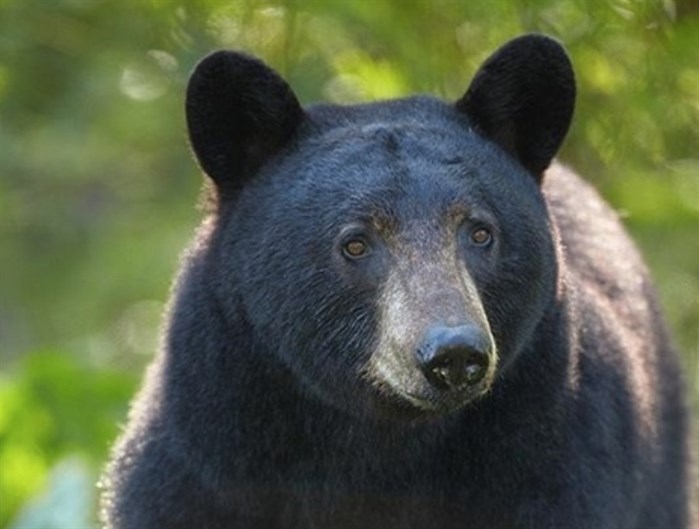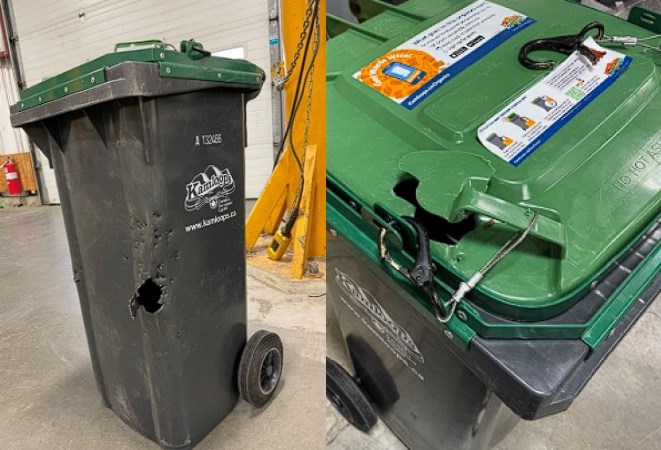
FILE PHOTO - A black bear is seen in this undated WildSafeBC photo.
Image Credit: WildSafeBC
June 04, 2024 - 10:12 AM
Conservations officers have had to put one bear down in Kamloops this year so far.
It comes as reports of black bears are up 30%, according to the BC Conservations Officer Service.
Those sightings have largely been concentrated to higher elevation neighbourhoods like Aberdeen, Upper Sahali and Juniper, with other sightings in Westsyde. Not only are sightings up, but there has also been a 60% increase of bears getting into unsecured garbage and food scraps over years previous, a BC Conservation Officer Service spokesperson said in an emailed response to questions.
The conservation officer service said one bear needed to be put down to "keep people safe," but didn't say exactly when that occurred or in what neighbourhood it was returning.
The emailed statement also didn't say whether the bear was getting into garbage or organic bins, a program that rolled out to the whole city last year. The statement did, however, warn the public of the importance of keeping attractants secure.
"We all need to do a better job to secure our garbage and make sure bears don’t become used to food that’s not natural to them," the statement read. "If bears have become used to food that’s not natural to them, or if they’re not afraid of people, they can’t be relocated or rehabilitated without risking people’s safety."
Meanwhile, the City of Kamloops is considering a more widespread adoption of "bear-resistant" compost bins, but they'll likely come at a cost.
A City staff report proposing bear-resistant organic bins be made available across Kamloops will be discussed at a council committee meeting Tuesday, June 4.
According to the report, the City gave out 255 bear-resistant carts, which have locks and reinforced lids, to Juniper residents last year as a pilot program. By the end of April 2024, two of those carts were damaged by bears that tried and failed to get the food scraps inside.
Staff followed up with the homes using bear-resistant carts on a monthly basis and found 32% were stored outside and another 30% weren't being locked during bear season.
The report doesn't compare those 255 carts with the regular compost bins and it doesn't say whether or not staff saw an increase in bear activity because of the new program.

Two bear-resistant compost bins seen after bears tried to get at the food scraps inside.
Image Credit: SUBMITTED/City of Kamloops
More than 60% of respondents to a city-wide survey said they had seen bears in their neighbourhood over the past year. Half of those said the bears were seen getting into garbage. Most of the 548 responses came from Juniper Ridge, Dallas and Barnhartvale residents.
Sixty-six per cent of respondents said bear-resistant carts will minimize wildlife conflicts in their neighbourhood, but far fewer wanted to pay extra for those carts, according to the staff report.
Just 32% said they would be willing to pay $20 or less per year for the bear resistant carts, with only 18% willing to pay up to $40 per year.
Despite this, City staff want to bring in the optional cart for a cost of $20 per year.
The regular bins cost $70, while the bear-resistant ones cost the city $195. Staff are recommending a $20 annual lease fee for those who want the bear-resistant carts to "offset" the higher cost.
Staff are suggesting not to roll them out for the whole city and only offer them on request for several reasons.
First, because not everyone who were part of the bear-resistant cart pilot program used their carts correctly, often leaving them unlocked outside. The second reason is that the carts don't work with trucks used in laneway pickups, which is largely restricted to downtown and the North Shore. Staff also suggested the bear-resistant carts "may encourage" residents to leave solid waste outside of secured enclosures like a garage, leaving them more vulnerable to bears.
In order to roll out city-wide, it would also cost more than $5 million. Staff said it would be "expensive" to roll out to entire neighbourhoods where bears are more likely to be a hazard, like Pineview, Upper Sahali, Juniper Ridge and Dufferin.
It's not clear how much a selective rollout would cost.
To contact a reporter for this story, email Levi Landry or call 250-819-3723 or email the editor. You can also submit photos, videos or news tips to the newsroom and be entered to win a monthly prize draw.
We welcome your comments and opinions on our stories but play nice. We won't censor or delete comments unless they contain off-topic statements or links, unnecessary vulgarity, false facts, spam or obviously fake profiles. If you have any concerns about what you see in comments, email the editor in the link above. SUBSCRIBE to our awesome newsletter here.
News from © iNFOnews, 2024